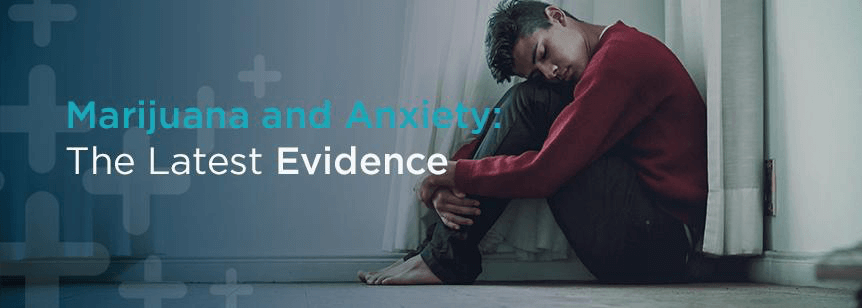
Anxiety disorders are the most common mental illnesses in the United States. Two key statistics: 40 million adults suffer from them, and only 37% get treatment.
There are at least 10 different types of anxiety disorders, including generalized anxiety disorder (GAD, the most common), panic disorders, phobias, and post-traumatic stress disorder (PTSD).
For anxiety sufferers, the symptoms are serious. Among the effects that can make daily living difficult: fatigue, restlessness, sweating, difficulty concentrating, racing thoughts, nausea, palpitations, insomnia, excessive worry, and fear. The disorder takes a toll: People with an anxiety disorder are three to five times more likely to go to the doctor and six times more likely to be hospitalized for psychiatric disorders than those who do not suffer from anxiety disorders, according to the Anxiety and Depression Association of America.
Here’s another statistic about anxiety: It’s the #2 reason people give for using medical marijuana, cited by 58% of users in a Washington State University study. That’s second only to pain, cited by 61% of respondents. What follows is a more detailed look at the use of marijuana for treating anxiety.
Surprisingly, given that anxiety is such a commonly cited reason for using marijuana, it’s listed as a qualifying condition in only two states (New Jersey and Pennsylvania, which just approved it for this use in July 2019) and one territory (Puerto Rico) that have legalized the medical use of marijuana. Several states, however—including California, Maine, Massachusetts, Missouri, Oklahoma, Rhode Island, Virginia, and West Virginia—have liberal laws that allow cannabis to be prescribed at a physician’s discretion. Most states that have legalized medical marijuana also allow it to be used in the treatment of PTSD.
Although researchers don’t fully understand why cannabis can ease anxiety symptoms, the endocannabinoid (ECS) system may be at the heart of it. Some experts consider this to be the 12th major system in the body, alongside the circulation, respiratory, digestive, and other systems.
Although understanding of the ECS is a work in progress, it’s thought to help bring balance to the body and ensure all the systems are working together. It’s composed of cannabinoid (CB) receptors in the brain that are involved in processes ranging from coping with stress to creating memories. These receptors are also vital for responding to anxiety and fear. Small doses of cannabinoids found in marijuana may interact with those receptors and help support the ECS and enhance its function—thus reducing anxiety and fear.
Research into cannabis use for medical purposes has been hindered in past years by the Drug Enforcement Agency (DEA), which considers marijuana a Schedule 1 drug and makes it difficult for scientists to study it. But those restrictions are starting to lift, and some studies provide evidence of marijuana’s effectiveness in fighting anxiety.
One key study, for example, was conducted at Washington State University and published in the Journal of Affective Disorders in 2018. Among its findings:
Additional research has been done on CBD alone. Studies in the Journal of Psychopharmacology and Nature found that the compound is effective in treating social anxiety. An analysis of studies in Neurotherapeutics also concluded that CBD holds promise as a treatment for social anxiety as well as several other anxiety disorders, including panic disorder, obsessive-compulsive disorder, GAD, and PTSD.
It’s important to note that too much THC can actually exacerbate anxiety. The compound can raise the heart rate, and high doses have been associated with panic attacks and paranoia. Feelings of dizziness, nausea, confusion, and blurred vision following cannabis use can also contribute to anxiety. Canadian researchers who have studied cannabis recommend that any addition to an initial dose should be made slowly, over the course of two weeks.
Also keep in mind that genetics, age, sex, and body fat are among the factors that determine how someone with anxiety will react to cannabis. The fact that there are so many different types of anxiety disorders, and that each can range in severity and have different neurochemical roots, complicates matters further.
And finally, experts don’t recommend cannabis as a first-line, solo, or long-term treatment for anxiety. Patients are advised to seek therapy, combined in some cases with other medication, to manage their illness.
Andrea Barbalich, a journalist who has held top editorial positions at Meredith, Scholastic, and Rodale, writes frequently about health for RD, AARP, Health Monitor Network, and other outlets.
No Information on MarijuanaDoctors.Com should be used to diagnose, treat, prevent or cure any disease or condition. You can view our Full Disclaimer here.